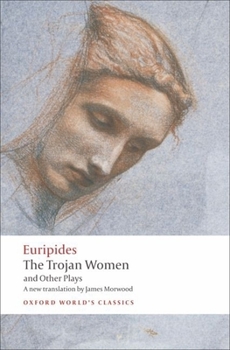The Trojan Women and Other Plays
Select Format
Select Condition 
Book Overview
This volume of Euripides' plays offers new translations of the three great war plays Trojan Women, Hecuba, and Andromache, in which the sufferings of Troy's survivors are harrowingly depicted. With unparalleled intensity, Euripides--whom Aristotle called the most tragic of poets--describes the horrific brutality that both women and children undergo during war. Yet, in the war's aftermath, this brutality is challenged and a new battleground is revealed where the women of Troy evince an overwhelming greatness of spirit.
We weep for the aged Hecuba in her name play and in Trojan Women, while at the same time we admire her resilience amid unrelieved suffering. Andromache, the slave-concubine of her husband's killer, endures her existence in the victor's country with a stoic nobility. Of their time yet timeless, these plays insist on the victory of the female spirit amid the horrors visited on them by the gods and men during war.
About the Series: For over 100 years Oxford World's Classics has made available the broadest spectrum of literature from around the globe. Each affordable volume reflects Oxford's commitment to scholarship, providing the most accurate text plus a wealth of other valuable features, including expert introductions by leading authorities, voluminous notes to clarify the text, up-to-date bibliographies for further study, and much more.
We weep for the aged Hecuba in her name play and in Trojan Women, while at the same time we admire her resilience amid unrelieved suffering. Andromache, the slave-concubine of her husband's killer, endures her existence in the victor's country with a stoic nobility. Of their time yet timeless, these plays insist on the victory of the female spirit amid the horrors visited on them by the gods and men during war.
About the Series: For over 100 years Oxford World's Classics has made available the broadest spectrum of literature from around the globe. Each affordable volume reflects Oxford's commitment to scholarship, providing the most accurate text plus a wealth of other valuable features, including expert introductions by leading authorities, voluminous notes to clarify the text, up-to-date bibliographies for further study, and much more.
Format:Paperback
Language:English
ISBN:0199538816
ISBN13:9780199538812
Release Date:January 2009
Publisher:Oxford University Press
Length:224 Pages
Weight:0.35 lbs.
Dimensions:0.5" x 5.2" x 8.2"
Related Subjects
Ancient & Classical Literature British & Irish Classical & Early Classics Criticism & Theory Drama Education & Reference English Literature Greek Greek & Roman History History & Criticism Humanities Humor & Entertainment Language Arts Linguistics Literary Literary Criticism Literary Criticism & Collections Literature Literature & Fiction Medieval Movements & Periods Tragedy Women in History Words, Language & GrammarCustomer Reviews
1 rating
Three tragedies by Euripides on the women of fallen Troy
Published by Thriftbooks.com User , 21 years ago
This Oxford World's Classic volume brings together three extant tragedies by Euripides dealing with the aftermath of the Trojan War: "Hecuba," "The Trojan Women," and "Andormache." After the fall of Troy, its queen, Hecuba, had become the slave of Odysseus and her daughter Polyxena is taken away to be slain on the grave of Achilles. However, in the Euripides play "Hecuba" it is the earlier death of another child, Polydorus that provides the motivation for what comes to pass. This was a child who had been sent for safety to the Thracian Chersonese. But now, after Hecuba hears of the death of Polyxena, the body of Polydorus washes up on shore. Apparently Hecuba's son-in-law Polymnester murdered the boy for the gold, which King Priam had sent to pay for his education. Agamemnon hears Hecuba's pleas, and Polymnester is allowed to visit the queen before she is taken away into captivity.The most fascinating aspect of "Hecuba" is that it gives us an opportunity to contrast the character of the queen of fallen Troy in this play by Euripides with that in "Trojan Women." This play was performed ten years earlier and its events take place right before the other play as well, although there is some overlap when Talthybius informs Hecuba of the death of Polyxena. In both dramas Hecuba is a woman driven by a brutal and remorseless desire for vengeance; however she proves much more successful in this drama than she does in "Trojan Women." Hecuba has harsh words for Helen, as in the other play, but her son Paris receives his fair share of approbation as well. This play also makes reference to the myth that Hecuba would meet her own hideous death, which reinforces the idea that there is much more of a moral degradation of her character in this play. "The Trojan Women" is the most famous of the anti-war plays of Euripides. About 416 B.C. the island of Melos refused to aid Athens in the war against Sparta. The Athenians then slaughtered the men and enslaved the women and children, an atrocity never before inflicted on one Greek city-state by another. As preparations were made for the ruinous expedition against Syracuse, Euripides wrote "The Trojan Women," as a plea for peace. Consequently there is a strong rhetorical dimension to the play, which prophesies that a Greek force would sail across the sea after violating victims and meet with disaster. However, there the play also has a strong literary consideration in that the four Trojan Women--Hecuba, Queen of Troy; Cassandra, daughter of Hecuba and Priestess of Apollo; Andromache, widow of Hector; and Helen--all appear in the final chapter of Homer's epic poem the "Iliad," mourning over the corpse of Hector, retrieved by his father Priam from the camp of the Acheans.This tragedy clearly reflects the cynicism of Euripides. Of all the Achean leaders in Homer only Menelaus, husband of Helen, appears. He appears, ready to slay Helen for having abandoned him to run off to Troy with Paris, but we see his anger melt bef





